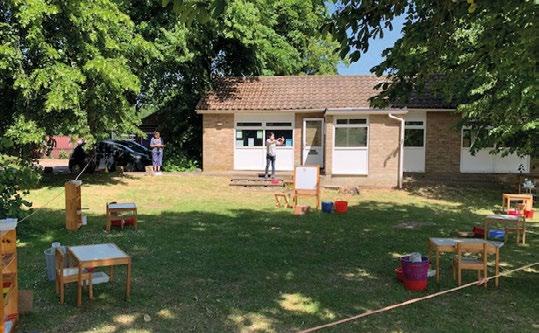
4 minute read
The importance of toddler play
“One of the biggest complaints from adults about their own childhood is the lack of play with their parents” (Margot Sutherland, Child Psychotherapist, The Science of Parenting).
Play is an enjoyable part of childhood, but also an important one for the developing brain. Through play, children develop physically, emotionally, cognitively and creatively. It allows them to engage in the world in a way that feels safe, explore different roles, address fears, and develop confidence.
Advertisement
Children who have parents who actively play with them, learn about sharing, problem solving and decision-making more quickly than those who don’t. Playing with your child also helps you understand their world and shows them you are interested in them, both important aspects of a secure attachment relationship, which is seen as the cornerstone of a child’s development.
It’s therefore very important to make time for play with our children, even though prioritising this can sometimes be difficult.
Playing and Playfulness
Playing is the act of doing; playfulness is a way of BEING!
Both are hugely important. Playfulness keeps communication positive, light and fun. Children are more likely to feel that they are enjoyable to be around, giving them a positive sense of who they are.
Being playful can help resolve conflicts and defuse difficult situations. When parents are rushed and tired, we tend to focus on getting quick results. Instead, try taking a deep breath and getting creative; the reward will be the chance to connect with your child, whilst also achieving the result that you wanted.
Eg: Reframe “You need to get dressed” as “Can you hop into your trousers like a frog?”
Adopt playfulness as a helpful attitude - make up rhymes and do silly dances. Laughter stimulates the release of feel-good chemicals, aids relaxation, increases positive feelings and improves relationships.
When you can’t be playful, don’t worry. Some of us find it easier than others and it’s hard to be light-hearted when life feels overwhelming. But practice DOES help! So, how do we initiate play? And what do we do?
A good environment is key
Without overloading your child, provide toys and varied activities (which stimulate different senses) without too many distractions. Children need to engage in both calming as well as stimulating activities, so they can differentiate between the two and learn to regulate their feelings.
You’ve made the time and created the environment. Now what?
You may feel out of your comfort zone. Try not to worry. Make play a joint venture but be led by your child. To enhance connection, Dan Hughes, clinical psychologist, refers to the process of ‘follow, lead, follow’ – let your child explore; show enjoyment; mirror what they are doing and build upon it for them, so that they can expand their play repertoire. Try to stick to their agenda, not yours. Repetition is an important part of learning and completely normal – even if dull for you!
Make playtime count
Attachment play focuses on connection. It is characterised by shared activities involving eye contact and mirroring – like peek-a-boo, drumming together and messy play. Letting children take the lead and being accepting, not critical, helps them learn and strengthens your connection. To maximise play time, turn housework into a game! Incorporate play and physical activity too – time spent in natural spaces outdoors is also good for both your wellbeing.
Dr Sarah Mundy is Consultant Clinical Psychologist and Author of Parenting Through Stories.

More info at www.parentingthroughstories.com
My Toddler is on Screens More - Is this Okay?

In the throes of the current pandemic, many parents are struggling to prioritise traditional play and are allowing their children more screen time. The effect touchscreens have on children (particularly toddlers) remains unclear, although research is underway at the University of Bristol.
There is some evidence that screen time can disrupt babies’ and toddlers’ sleep (Smith, 2017). However, other researchers report that touchscreens provide rewarding interaction with varied sensory and cognitive stimulation and that this may have positive impacts upon attention, fine motor control and other developmental areas.
The impact of touchscreens seems to depend upon the usage. If the content is developmentally and educationally appropriate then it is far more likely to have a positive impact upon children’s development than more passive watching of screens.*
So before you beat yourself up about not playing with your children as much as you’d like, remember that some active engagement in educational games on screens may actually be a positive thing.

find a class near you
berkshire@turtletots.com 07436 881137
Established 1980 Providing care and education for ages 2-6 years within a nurturing environment. Ofsted Outstanding in all areas.
FREE Montessori Education for funded 2-3 year olds
We can provide 15 and 30 hours across all 5 days if required (6 hours a day).


OPEN DAY Monday 23rd Nov 10am to 12 noon
Home Park, Romney Lock Road, Windsor SL4 6HX Tel: 01753 868399 OR 01344 844592 e.menik@windsor-montessori.com
www.windsormontessorischool.co.uk




Thames Valley East Thames Valley East
DISTRIBUTING 19,000 COPIES EVERY ISSUE
Maidenhead I Windsor I Marlow I Ascot Slough I Egham










